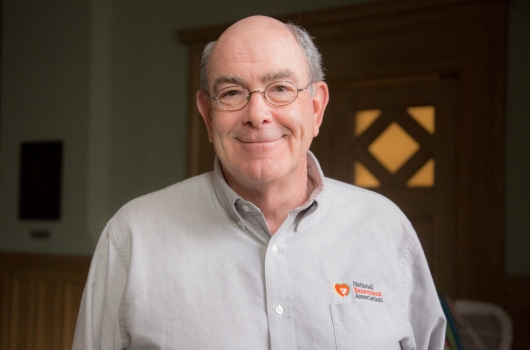Black Lives Matter

The violence and tragedies of last week have us, at the National Benevolent Association, in deep sorrow and prayer. Our mission statement reminds us that we as a ministry are to follow God’s call to advocate for the well-being of all humanity and to accompany one another in the creation of communities of compassion and care. In the coming days, the NBA will continue to share some of the intentional conversations and resources that we have as healthcare providers and direct service ministries related to healing, peace, and justice. Read our full response and find ongoing resources at: https://www.nbacares.org/care-resources/nba-response-to-crisis-and-trauma.
Last March, I had the privilege and pleasure to meet Carter. He is the newborn son of a friend and colleague of mine. Smiling, cooing, and resting in his grandmother’s arms, Carter represented all that is good and hopeful in this world. A new life. Loving parents. A caring extended family. Friends who are there to support him. What a blessing!
However, beyond those sparkling and alive eyes, lay the unspoken, yet real, concerns of Carter’s parents. What does it mean to bring a beautiful African-American boy into the world today? A world where black and brown men are stopped, questioned, arrested and often imprisoned at a scandalously higher rate than white men.

For my friend, what thoughts, worries, and concerns accompany this precious event of bringing a new life into her family in a country where it seems that black lives don’t matter? What does it mean to send a black child off to school wondering if he will return at the end of the day? What does it mean to know that your adolescent son could be walking down the street, minding his own business, and be accosted and even killed just because of the color of his skin? I cannot answer those questions.
However, when asked to join a press conference with other white clergy after the deaths of Alton Sterling, Philando Castile, and the five police officers in Dallas, Texas—Brent Thompson, Patrick Zamarripa, Michael Krol, Michael Smith, and Lorne Ahrens—I dropped everything to attend. It was the least I could do under such tragic, shocking, disturbing, and upsetting circumstances. To stand with other clergy, robed in our vestments to show support for those black lives that were taken so needlessly, and for those police officers whose deaths came at the hands of a disturbed African-American army veteran, for me, was an affirmation of my faith.
We Cannot Wait Until Tomorrow to Take Action
I get frustrated sometimes when people gather in response to these recurring tragedies and nothing seems to happen. Nothing seems to change. Nothing seems to move us toward a more peaceful and loving world. A world not only envisioned and described by Jesus, but also mapped out with a specific “to-do” list. A “to-do” list that we seem to have discarded along the way.
These issues are complicated but not unresolvable. Many of the systems in place in America are antiquated and steeped in racist policies and practices. We can change that.
We can dismantle and rebuild. We can look at our criminal justice system, our school system, our economic system, and our housing system and begin to make changes. Changes that will level the playing field of opportunity and open the world of possibilities and hope to every American.
I continue to address one small aspect of that—the world of our prisons and jails. But the prevalence of systemic racism there intersects and bleeds into virtually every other aspect of life. Each of us can find our place in the landscape and take steps to disgorge the evil that has entered and claimed our country’s infrastructure.
Begin by watching the film Injustice Anywhere, produced by the National Benevolent Association. Stream the film at www.nbacares.org/InjusticeAnywhere. This powerful and moving film was made in the aftermath of the shooting of Michael Brown in Ferguson, Missouri. Disciple pastors and congregation members became involved in their community as questions were asked and actions taken. Filmmaker Aziza Binti writes, “This film seeks to provide solutions, ideas, and compassion for Disciples to see just how valuable their efforts can be, even on a small scale. Social justice is not just ‘their’ problem; it’s everyone’s concern.”
Find others in your congregation to watch with you, or better yet, if your own congregation is mostly white, invite folks from other predominately black or brown congregations to join you. But don’t stop there. Download the study guide from that resource page and use it as a tool for discussion, reflection, and action. We cannot wait until tomorrow to take action.
I live miles and miles away from Carter and his parents. He is growing and thriving every day. Though I cannot affect his everyday world where he is living (I don’t really need to; he is in very good hands!), I can do what I can to make the world a better, safer, and saner place for Carter as he grows up. Together, we can make a difference. As Dr. King reminded us, “Injustice anywhere is a threat to justice everywhere.”
Rev. Dean Bucalos serves as part-time Mission Specialist for NBA Prison and Jail Ministries.